Türkiye (Turkey) and Syria earthquake 2023: a year on
A series of earthquakes devastated Türkiye and Syria in February 2023. Since then, lives have been reshaped, and ongoing needs are immense.
Last updated 15 July 2025
The road to recovery is long
On 6 February 2023, a series of earthquakes killed over 55,000 people in Türkiye (Turkey) and Syria, in the worst earthquakes the region has seen in 20 years.
Emotional scars run deep – many people still live surrounded by rubble in a constant visual reminder of the tragedy. Many others have never recovered their loved ones and are unable to grieve.
Staff and volunteers from the Syrian Arab Red Crescent and the Turkish Red Crescent (Kızılay) have supported those hardest hit from the start.
Support our work in Türkiye and Syria
Syria and Türkiye need long-term support – from distributing essential aid items, providing cash assistance to help families rebuild their lives, to providing psychological support.
DONATE TO THE DISASTER FUND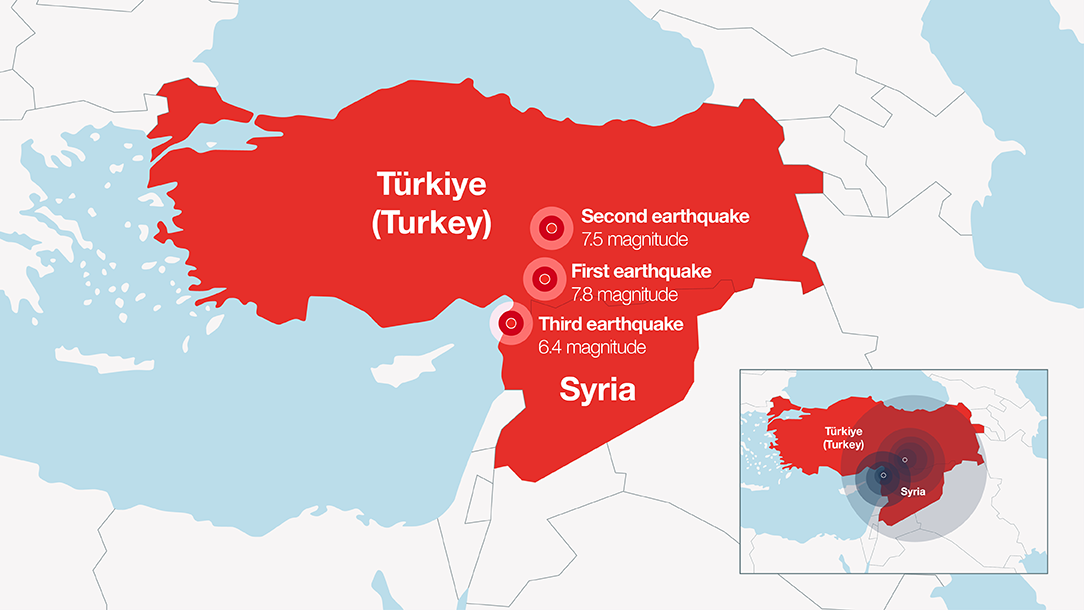
A series of earthquakes devastated parts of Türkiye and northern Syria in February 2023.
2023 Turkey Syria earthquake: What happened?
The first powerful earthquake of 7.8 magnitude struck in the early hours of the 6 February 2023 when most people were at home in bed. The epicentre was near the Turkish city of Gaziantep, which is around 150 miles north of the Syrian border.
The second earthquake, just hours later at 1.30pm local time, was further north in central Türkiye and measured 7.5 magnitude. Extensive damage was caused, with buildings collapsing in cities including Adana, Adiyaman, Diyarbakir, Gaziantep, Hatay, Kahramanmaras, Kilis, Matalya, Osmaniye and Sanliurfa.
In Syria, there were reports of collapsed buildings in the Aleppo, Idlib, Lattakia, and Hamma governorates, and extensive damage in rural Damascus.
How has the Red Crescent supported Türkiye and Syria?
Red Crescent teams in both Türkiye and Syria responded to the earthquake immediately.
Since then, more than 80,000 Red Crescent staff and volunteers have worked tirelessly to provide vital support across both countries.
In total, teams have supported 14 million people.
What is the situation today in Türkiye?
In Türkiye, 37,066 buildings collapsed, and over 200,000 buildings were heavily damaged. Rebuilding and recovery will take years, even with the support of the international community.
Hundreds and thousands of people, including children, are living in tents and makeshift shelters with limited access to basic necessities and services, and many have lost their source of income.
The affected region was also hosting more than 1.7 million Syrian refugees (47 per cent of all Syrian refugees in Türkiye) prior to the earthquakes.
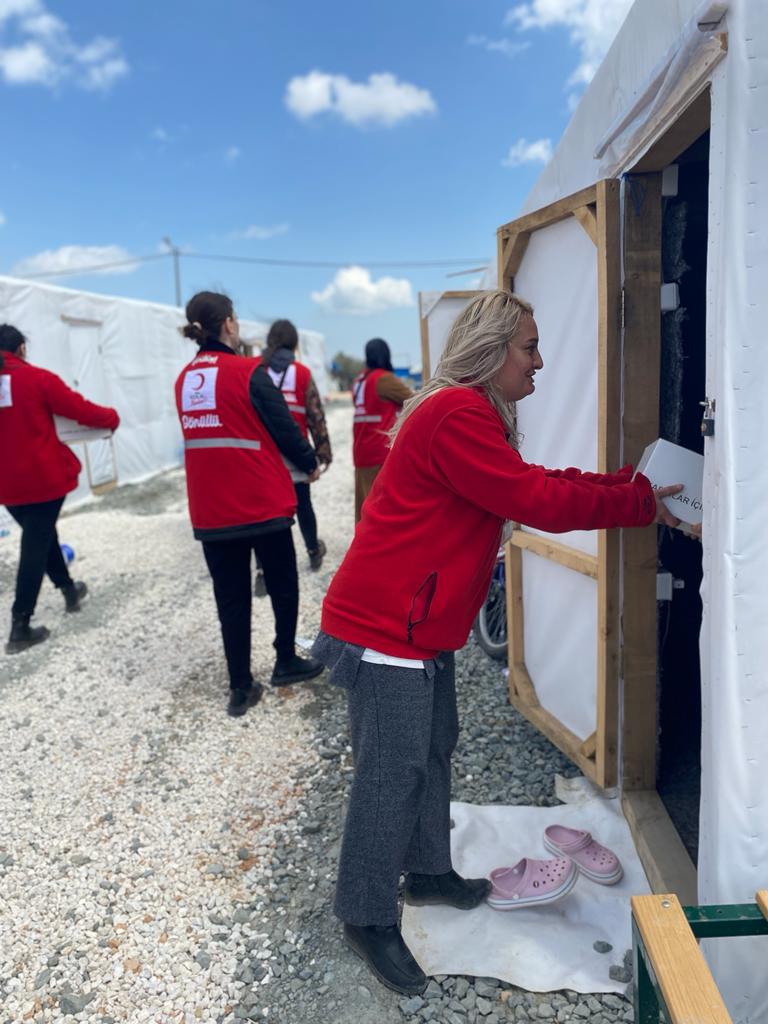
Meltem, from the Turkish Red Crescent, gives support packages to families living in temporary shelters. PHOTO: Turkish Red Crescent.
How has the Red Crescent been supporting people in Türkiye?
The Turkish Red Crescent Society, or Kızılay, has specific roles under the Turkey Disaster Response Plan.
Expert teams from Kızılay Disaster Response Centers and branches were immediately sent to the region and have been working with the communities ever since, despite being affected themselves.
During the acute phase, Kızılay prepared three meals a day for earthquake victims. The priority was to meet people's nutritional needs, before families moved to containers with cooking facilities. 764,020 people were supported.
Responsible for meeting the country's blood needs, Kızılay also delivered blood from 300 donation points across Turkey. After the earthquake, 1,506,002 people rushed to our blood donation centres.
Other vital services have included water and sanitation, cash support and medical care. Through 12 mobile health units, Kızılay’s volunteer doctors, nurses, public health experts, and psychologists delivered services alongside the Ministry of Health, ranging from echocardiograms and x-rays to vaccinations and first aid.
Ahmed is originally from Syria, but has been living in Reyhanli, Türkiye, a city on the Turkish-Syrian border since 2015. After the earthquake destroyed his home, Ahmed and his family slept outside for ten days.
He says that the earthquake triggered painful memories for the family:
“What I saw here when the earthquake hit was truly heartbreaking. It reminded me of what we experienced in Syria when the shelling used to start. We used to suddenly fall in the street, hide and sleep under trees and in corners. It was very scary.”
“It was extremely sad and made me want to cry, seeing all those victims, women and children. I didn’t know who to help first. I saw people crying over their children, others over their wives and others over their siblings. I saw buildings that were totally damaged."
Ahmed is now living in temporary housing and has been supported with cash assistance by the Turkish Red Crescent, so he can pay rent and buy food. He says:
Without the cash-based assistance, I feel we would have nothing. It helped us cover rent and water bills, and we even used it to buy bread sometimes.
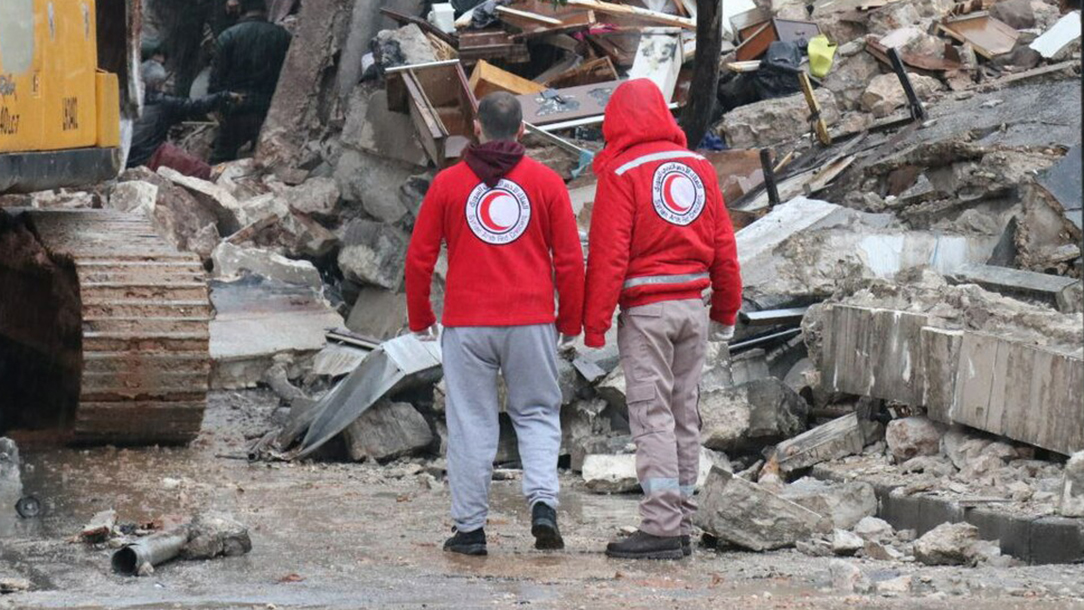
What is the situation after the earthquakes in Syria in 2024?
In Syria, eight million people were directly impacted by the earthquakes. More than 5,550 lives were lost and almost 12,000 were injured.
Thousands of people remain displaced. Many of those affected by the earthquake were already living in vulnerable conditions due to 12 years of armed conflict and a severe and worsening economic crisis. This has caused extensive destruction of cities and towns, massive internal and international displacement..
Two years on, we are deeply worried and concerned about the gravely deteriorating humanitarian situation in Syria - there is still a desperate need for relief, recovery and longer-term support.
How has the Red Crescent been supporting people affected by the earthquakes in Syria?
Across the border, the Syrian Arab Red Crescent (SARC) was also on the ground as soon as the earthquake hit, providing life-saving assistance and support to those in need in the regions of Hama, Aleppo, Latakia and Tartous.
In total, 15.8 million individual services have been provided by the disaster management team over the last year:
- 6.8 million medical services have been provided by the health department
- 76,600 services have been provided by the legal service team
- 400,000 services have been provided by the water and rehabilitation team.
- 33,000 families have received cash assistance
- 1,500 families have benefited from livelihood projects
In the centre of Latakia the Syrian Arab Red Crescent's health clinic was so badly damaged by the earthquakes that is has not been safe to treat patients inside it.
Instead, people like Dr Fatima have been providing emergency and non-emergency care in a mobile medical unit.
Dr Fatima says: "We are here in front of the clinic two days a week, and three other days a week we head into the remote villages," she says.
"We've encountered many diseases that were the result of people leaving their homes - lice, scabies, diarrhoea. We have medicine and treatment available but not enough for all the needs people have."
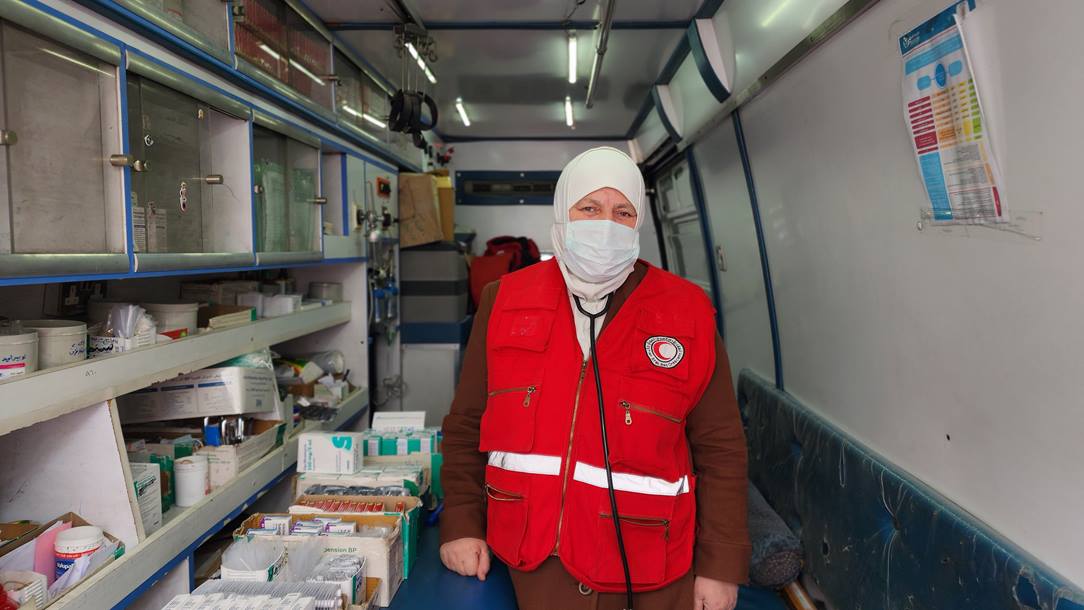
Dr Fatima is one of the Syrian Arab Red Crescent medical doctors providing healthcare for people affected by the earthquake and 12-year long conflict. PHOTO: Jani Savolainan/IFRC
Over 4,000 dedicated Syrian Arab Red Crescent volunteers like Dr Fatima, are still supporting people affected by the earthquake crisis every day.
A huge part of their work has been to help children affected by years of conflict and the traumatic effects of the earthquakes themselves. What little normalcy they had, such as going to school with friends, was destroyed in hours.
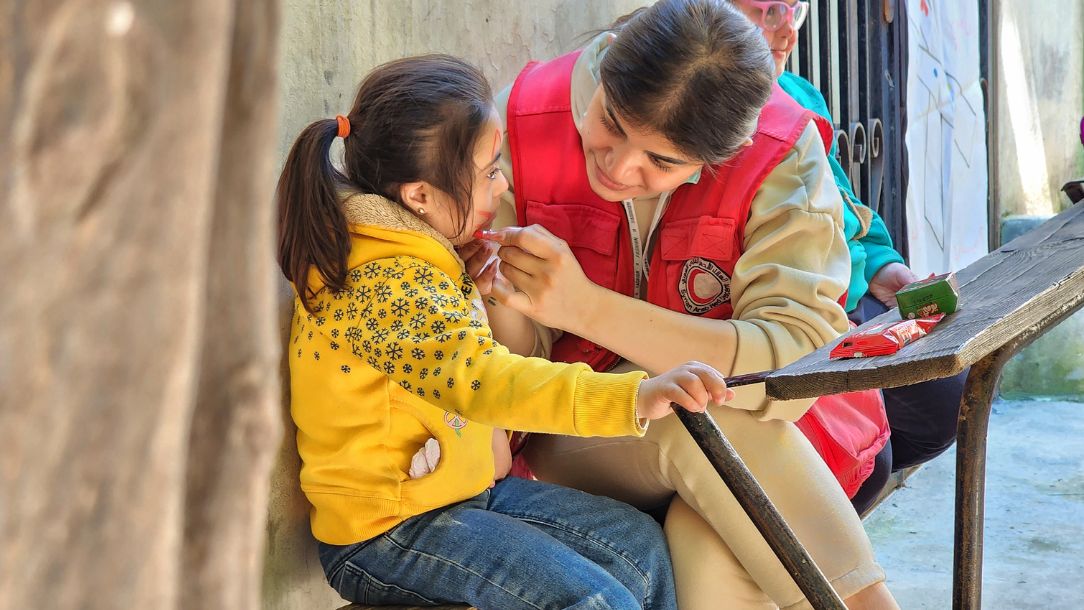
A Syrian Arab Red Crescent volunteer provides psychosocial support to a young girl affected by the earthquakes.
At SARC-run mobile health centres, psychosocial support specialists are giving children tools to cope and talk through their problems.
One of the most important goals is to make the children feel safe. But they also encourage play, fun and learning: many of Syria's young people have had to take on heavy responsibilities at a very young age.
Find out more about our psychosocial support work in Syria
British Red Cross support in Syria
In Syria, the British Red Cross has a long-standing partnership with SARC, supporting them in the most locally effective and efficient way.
Given the scale of needs in Syria, we are providing support to those affected by the earthquake and people severely affected by the other ongoing crises.
You may also be interested in
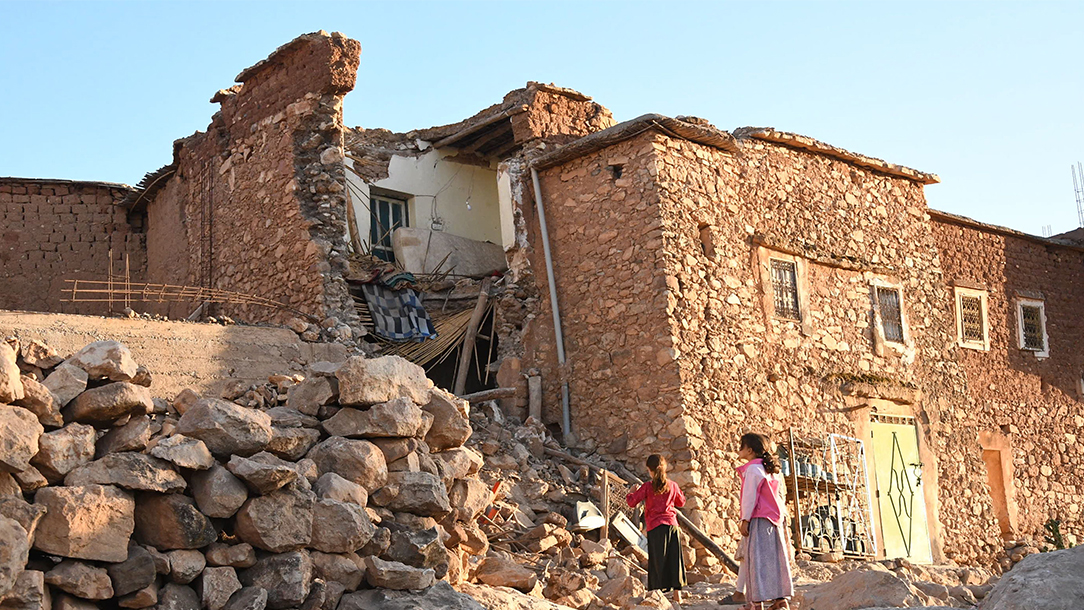
Morocco earthquake 2023: humanitarian needs remain high
Urgent search and rescue operations are underway in Morocco, after a powerful earthquake struck the Al Haouz province. More than two thousand people were killed and many more are missing.
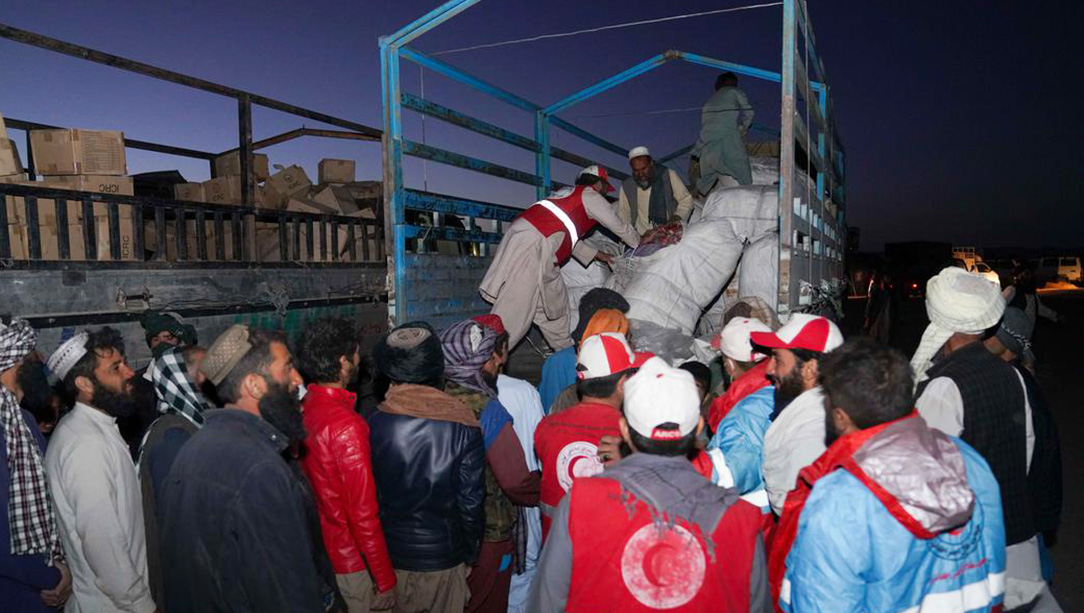
Afghanistan earthquake: thousands affected in Herat province
A deadly earthquake has killed more than 2,000 people in Herat, Afghanistan and left many families homeless.
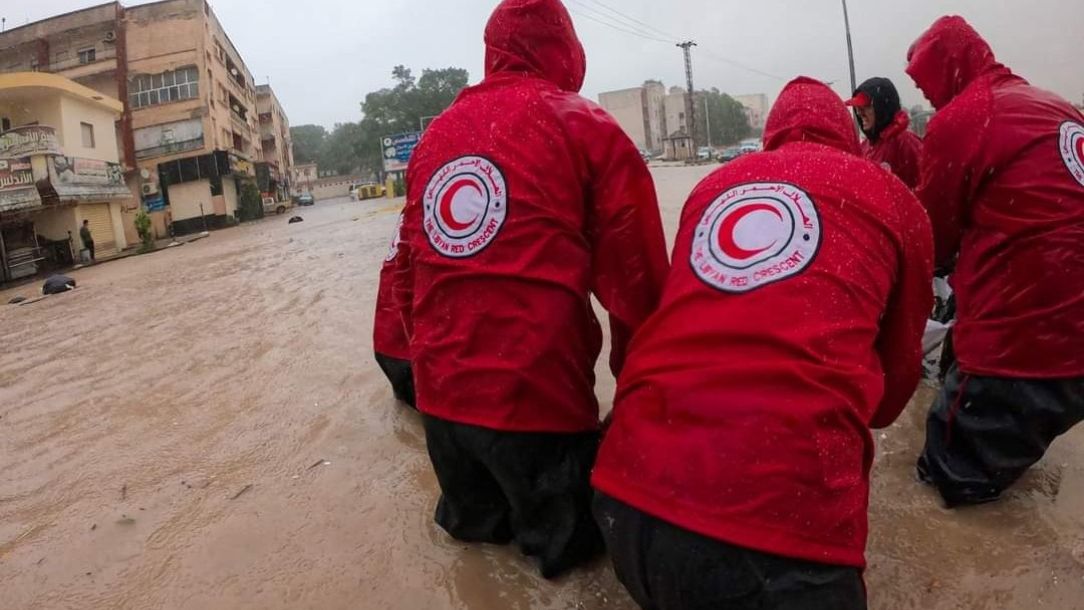
Libya floods 2023: thousands die after Storm Daniel causes catastrophic flooding
Floods in Libya have left thousands of people dead and destroyed thousands and homes. Find out more about the devastating flooding and how the Red Cross is helping.
Disaster Fund
A donation to our Disaster Fund will help us respond to disasters in the UK and around the world, including armed conflict, wildfires, flooding and other natural disasters
DONATE TO THE DISASTER FUND
